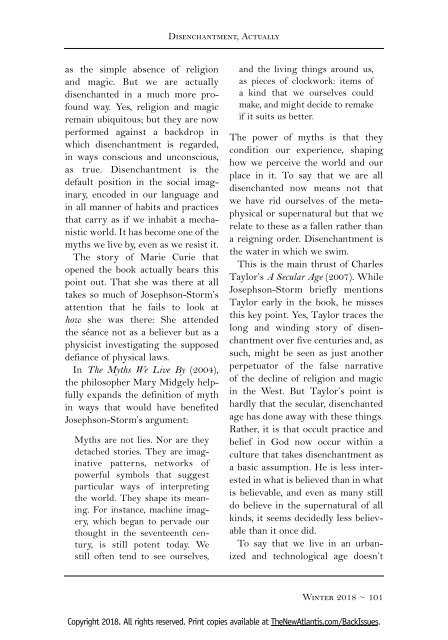The New Atlantis - Winter 2018 (Issue 54) uncompressed with cover
You also want an ePaper? Increase the reach of your titles
YUMPU automatically turns print PDFs into web optimized ePapers that Google loves.
Disenchantment, Actually<br />
as the simple absence of religion<br />
and magic. But we are actually<br />
disenchanted in a much more profound<br />
way. Yes, religion and magic<br />
remain ubiquitous; but they are now<br />
performed against a backdrop in<br />
which disenchantment is regarded,<br />
in ways conscious and unconscious,<br />
as true. Disenchantment is the<br />
default position in the social imaginary,<br />
encoded in our language and<br />
in all manner of habits and practices<br />
that carry as if we inhabit a mechanistic<br />
world. It has become one of the<br />
myths we live by, even as we resist it.<br />
<strong>The</strong> story of Marie Curie that<br />
opened the book actually bears this<br />
point out. That she was there at all<br />
takes so much of Josephson-Storm’s<br />
attention that he fails to look at<br />
how she was there: She attended<br />
the séance not as a believer but as a<br />
physicist investigating the supposed<br />
defiance of physical laws.<br />
In <strong>The</strong> Myths We Live By (2004),<br />
the philosopher Mary Midgely helpfully<br />
expands the definition of myth<br />
in ways that would have benefited<br />
Josephson-Storm’s argument:<br />
Myths are not lies. Nor are they<br />
detached stories. <strong>The</strong>y are imaginative<br />
patterns, networks of<br />
powerful symbols that suggest<br />
particular ways of interpreting<br />
the world. <strong>The</strong>y shape its meaning.<br />
For instance, machine imagery,<br />
which began to pervade our<br />
thought in the seventeenth century,<br />
is still potent today. We<br />
still often tend to see ourselves,<br />
and the living things around us,<br />
as pieces of clockwork: items of<br />
a kind that we ourselves could<br />
make, and might decide to remake<br />
if it suits us better.<br />
<strong>The</strong> power of myths is that they<br />
condition our experience, shaping<br />
how we perceive the world and our<br />
place in it. To say that we are all<br />
disenchanted now means not that<br />
we have rid ourselves of the metaphysical<br />
or supernatural but that we<br />
relate to these as a fallen rather than<br />
a reigning order. Disenchantment is<br />
the water in which we swim.<br />
This is the main thrust of Charles<br />
Taylor’s A Secular Age (2007). While<br />
Josephson-Storm briefly mentions<br />
Taylor early in the book, he misses<br />
this key point. Yes, Taylor traces the<br />
long and winding story of disenchantment<br />
over five centuries and, as<br />
such, might be seen as just another<br />
perpetuator of the false narrative<br />
of the decline of religion and magic<br />
in the West. But Taylor’s point is<br />
hardly that the secular, disenchanted<br />
age has done away <strong>with</strong> these things.<br />
Rather, it is that occult practice and<br />
belief in God now occur <strong>with</strong>in a<br />
culture that takes disenchantment as<br />
a basic assumption. He is less interested<br />
in what is believed than in what<br />
is believable, and even as many still<br />
do believe in the supernatural of all<br />
kinds, it seems decidedly less believable<br />
than it once did.<br />
To say that we live in an urbanized<br />
and technological age doesn’t<br />
<strong>Winter</strong> <strong>2018</strong> ~ 101<br />
Copyright <strong>2018</strong>. All rights reserved. Print copies available at <strong>The</strong><strong>New</strong><strong>Atlantis</strong>.com/Back<strong>Issue</strong>s.


